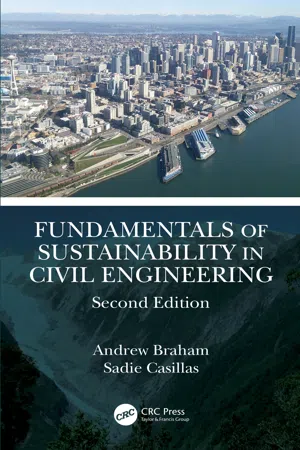
- 256 pages
- English
- ePUB (mobile friendly)
- Available on iOS & Android
Fundamentals of Sustainability in Civil Engineering
About this book
This book provides a foundation to understand the development of sustainability in civil engineering, and tools to address the three pillars of sustainability: economics, environment, and society. It includes case studies in the five major areas of civil engineering: environmental, structural, geotechnical, transportation, and construction management. This second edition is updated throughout and adds new chapters on construction engineering as well as an overview of the most common certification programs that revolve around environmental sustainability.
Features:
- Updated throughout and adds two entirely new chapters
- Presents a review of the most common certification programs in sustainability
- Offers a blend of numerical and writing-based problems, as well as numerous application-based examples that utilize concepts found on the Fundamentals of Engineering (FE) exam
- Includes several practical case studies
- Offers a solution manual for instructors
Fundamentals of Sustainability in Civil Engineering is intended for upper-level civil engineering sustainability courses. A unique feature is that concepts found in the Fundamentals of Engineering (FE) exam were targeted to help senior-level students refresh and prepare.
Tools to learn more effectively

Saving Books

Keyword Search

Annotating Text

Listen to it instead
Information
1 Introduction to Sustainability
We hold the future in our hands, together, we must ensure that our grandchildren will not have to ask why we failed to do the right things, and let them suffer the consequences.Ban Ki-moon
1.1 The Development of Sustainability through the United Nations
- 1. to save succeeding generations from the scourge of war, which twice in our lifetime has brought untold sorrow to mankind,
- 2. to reaffirm faith in fundamental human rights, in the dignity and worth of the human person, in the equal rights of men and women and of nations large and small,
- 3. to establish conditions under which justice and respect for the obligations arising from treaties and other sources of international law can be maintained, and
- 4. to promote social progress and better standards of life in larger freedom.
- 1. to practice tolerance and live together in peace with one another as good neighbors,
- 2. to unite our strength to maintain international peace and security,
- 3. to ensure, by the acceptance of principles and the institution of methods, that armed force shall not be used, save in the common interest, and
- 4. to employ international machinery for the promotion of the economic and social advancement of all peoples.
- 1. Maintain essential ecological processes and life support systems,
- 2. Preserve genetic diversity, and
- 3. Ensure sustainable utilization of species and ecosystems.

- 1. Poverty eradication,
- 2. Changing unsustainable and promoting sustainable patterns of consumption and production, and
- 3. Protecting and managing the natural resource base of economic and social developments...
Table of contents
- Cover
- Half-Title
- Title
- Copyright
- Dedication
- Contents
- Preface
- Acknowledgments
- Authors
- Chapter 1 Introduction to Sustainability
- Chapter 2 Pillar: Economic Sustainability
- Chapter 3 Pillar: Environmental Sustainability
- Chapter 4 Pillar: Social Sustainability
- Chapter 5 Application: Environmental Sustainability
- Chapter 6 Application: Geotechnical Sustainability
- Chapter 7 Application: Structural Sustainability
- Chapter 8 Application: Transportation Sustainability
- Chapter 9 Application: Construction Management
- Chapter 10 Sustainable Certification Programs
- Chapter 11 Tomorrow’s Sustainability
- Index
Frequently asked questions
- Essential is ideal for learners and professionals who enjoy exploring a wide range of subjects. Access the Essential Library with 800,000+ trusted titles and best-sellers across business, personal growth, and the humanities. Includes unlimited reading time and Standard Read Aloud voice.
- Complete: Perfect for advanced learners and researchers needing full, unrestricted access. Unlock 1.4M+ books across hundreds of subjects, including academic and specialized titles. The Complete Plan also includes advanced features like Premium Read Aloud and Research Assistant.
Please note we cannot support devices running on iOS 13 and Android 7 or earlier. Learn more about using the app